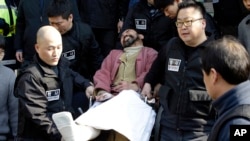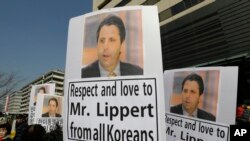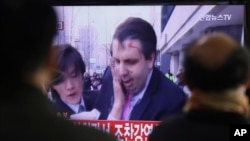Following the knife attack on the U.S. Ambassador to South Korea, Seoul police are looking into the suspect’s past visits to North Korea and evaluating the security at the event. The attack raises the question of just how prevalent anti-American sentiment is in South Korea today.
South Korean police said on Friday they will likely charge Kim Ki-jong, the suspect who carried out the knife attack on the U.S. ambassador in Seoul, Mark Lippert, with attempted murder.
Yoon Myeong-sung, the police chief of the Jongno district where the attack occurred, said they are also investigating whether the suspect’s frequent visits to North Korea are relevant to this case.
He said they are trying to find out if there is a mastermind behind the suspect Kim Ki-jong. They are focusing on the fact he visited North Korea seven times and are working on determining whether his visits are related to the crime.
Police raided his home and office Friday. If they find evidence that he supports the Kim Jong Un regime, he can be charged with breaking the state security law. He will also face charges for assaulting a foreign envoy and obstructing business operations.
Kim told police he acted alone. He said the attack was meant as a protest against the Joint U.S.-South Korea military exercises currently underway. He reportedly echoed past criticism from Pyongyang that these ongoing military exercises poison any efforts for reconciliation including the possibility for reunions of families that have been separated since the end of the Korean War in 1953.
Kim has a long history of ultra-nationalist activism and violence. He staged one-man protests against Japan over disputed islands. In 2010 he was arrested for throwing pieces of concrete at the Japanese ambassador and received a suspended prison sentence. His anti-American activities can be traced back to the 1990s, when he burned a U.S. flag on the embassy grounds in Seoul.
North Korea’s state news agency called the attack a “just punishment” for the joint U.S.-South Korea military drills which started this month, and which Pyongyang routinely criticizes.
South Korea’s Unification Ministry spokesman Lim Byeong-chul denounced the taunting North Korean state media statement that also claimed the attack on the U.S. envoy reflected public opinion in South Korea.
He said the ministry strongly condemns North Korea's distortion and fabrication regarding the nature of the incident, as well as the claims that the attack reflects public sentiment.
There have been protests in the past against the U.S. military presence in South Korea, but none recently.
In the last decade South Korean public opinion of the U.S. has grown more favorable as North Korea’s nuclear threat potential has risen and China’s foreign policy has become more assertive.
A 2014 public opinion poll conducted by the Asan Institute found that over 90 percent of the people surveyed stated that the alliance was a necessity.
Former U.S. ambassador to South Korea Christopher Hill said public opinion started turning in the U.S.’s favor after Washington took on a more collaborative approach to include South Korea, China, Japan and Russia, in dealing with North Korea.
“I’d like to think one of the reasons its gone well is that the U.S. engaged in the six party process, which did not exactly succeed in getting North Korea to give up their nuclear weapons, but we did succeed in kind of closing the gap that had grown between the U.S. and South Korea,” said Hill.
Both officials from President Park Geun-hye’s conservative government and the main opposition party have condemned the attack and reaffirmed the strong U.S.-South Korea Alliance.
Kim Young-man with the Korean Council for Reconciliation and Cooperation, the group that hosted the event where Ambassador Lippert was attacked, told VOA Kim Ki-jong’s views do not represent the views of their members, who may support more outreach and engagement with North Korea.
He said they do not hold radical discussions of progressive or conservative sides, and they do not work with the people who have a radical ideology on inter-Korean relations.
Ambassador Lippert is said to be recovering well but is in some pain following surgery for an 11-centimeter long gash on the right side of his face and a puncture wound on his left wrist that caused nerve damage.
Lippert will likely to remain at Yonsei University's Severance Hospital in Seoul until early next week, when doctors say they will be able to remove his stitches.
VOA News Producer Youmi Kim contributed to this report.







